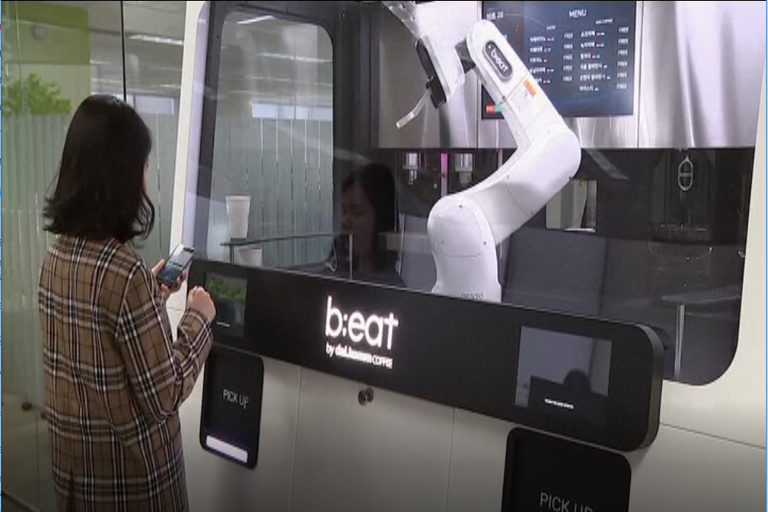Seoul: At a Dal.komm Coffee shop in Seoul, this robot barista takes orders remotely through a mobile app or kiosk cashier and then brews fresh coffee.
Coffee is just one of many industries which could be transformed by automated services in this tech-forward nation - a notion both exciting and worrisome as jobs become scarcer.
Less than a minute after an order is placed, the robot sends a 4-digit code the customer can use to open a pick-up box.
The robot can handle up to 14 drinks at a time. Drinks not retrieved within 10 minutes are thrown away, but another drink can be ordered at no extra charge.
The Dal.komm Coffee franchise has 45 robot-equipped outlets and says it's operating the country's first commercialised robot cafes. They're in shopping malls, company cafeterias, schools and an airport.
A Dal.komm Coffee robot can brew 90 cups an hour and about 300 cups a day on a single charge of beans and supplies. The drinks cost 2 to 3 US Dollars.
Also read: Now get head, foot massage on trains from Indore
Managers visit once a day on average to inspect and clean the robots. They also monitor them remotely through surveillance cameras and sensors.
While some customers like the convenience and novelty of robot coffee, others are not so keen.
Later this year, the robot's developer says it plans to launch an upgraded, faster and smarter version of the robot cafe.
It will be able to recognise voices and customer movements and offer personalised menu suggestions.
South Korean industries, including restaurants, convenience stores, supermarkets, banks and manufacturers are relying increasingly on robots and other automation.
But not without protest: many Koreans, especially the young, are struggling to find work.
Recently workers staged a strike, protesting growing use of unmanned small tower cranes at construction sites.
Labour unions have also protested against the use of automated check-out counters at Emart, South Korea's biggest supermarket chain.
At a recently opened unmanned jeans store - LAB101 - in Hongdae, a trendy neighbourhood in Seoul, a heavy iron door opens automatically when visitors swipe their credit cards through a machine next to the entrance.
The 24/7 denim shop lets customers try on jeans and pay using a self-service digital system without any dealings with sales staff, though sometimes technical glitches can pose a problem.
"I can freely look around and try on jeans as much as I like without being bothered," says customer Kim Kun Woo.
South Korea's 5.5 trillion won (USD 4.7 billion) robot market was among the top five, along with China, Japan, the U.S. and Germany, which together accounted for over 70 per cent of all robot sales in 2017.
The government is aiming to expand that market to 15 trillion won by 2023.
South Korea's minimum wage has jumped by 27.3 per cent over the last two years, adding to the incentive to cut labour costs by using automation, says Suh Yong Gu, a professor and Dean of the Business School at Sookmyung Women's University in Seoul.
It's also a welcome trend for millennials, who prefer not to have to interact with other humans, he says: "Currently, Millennials - those who were born after 1980 - are prime consumers. This generation tends to not like meeting other people, so they favour ... technology that enables people to minimise face-to-face interactions with others."
South Korea has been an early and enthusiastic adopter of automation, with the highest density of industrial robots in the world in 2017, at 710 robots per 10,000 manufacturing workers, according to the International Federation of Robotics, an international non-profit industry group that keeps track of data on robotics.
The global average was 85 robots per 10,000 employees.
Despite concerns over job losses, South Korea's food and retail businesses are replacing cashiers with automated kiosks. Fast-food chain Lotteria has the kiosks in more than 800 of its 1,350 stores. KFC has installed digitized cashiers in all of its stores.



